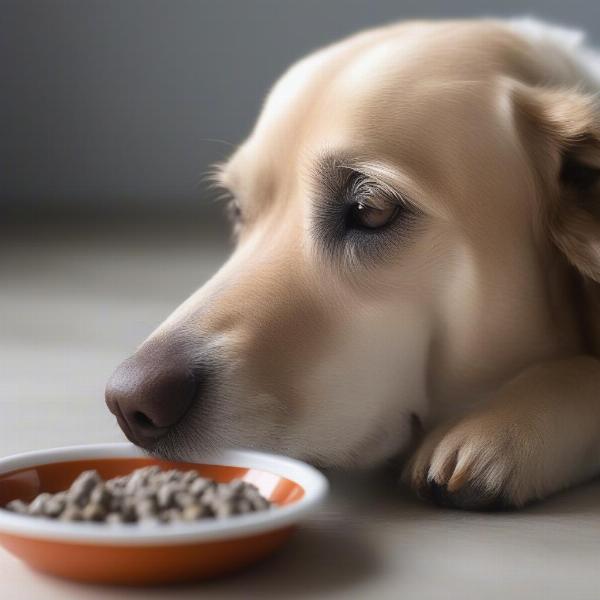Kidney disease is a common and serious health issue in dogs, especially as they age. Proper nutrition plays a crucial role in managing this condition and improving your dog’s quality of life. Choosing the right dog food renal diet can be overwhelming, with so many options available. This guide will help you understand the importance of renal diets, what to look for in a good dog food for kidney disease, and how to transition your dog to this new food.
 Dog with kidney disease eating renal food
Dog with kidney disease eating renal food
Understanding Renal Diets and Their Importance
When a dog’s kidneys are compromised, they struggle to filter waste products and maintain fluid balance effectively. This can lead to a build-up of toxins in the bloodstream, causing various health problems. Renal diets are specifically formulated to support kidney function by limiting the intake of certain nutrients, such as phosphorus, protein, and sodium, which can exacerbate kidney damage. renal dog food helps reduce the workload on the kidneys, allowing them to function more efficiently.
How Renal Diets Help Manage Kidney Disease
By reducing the intake of phosphorus, renal diets help prevent the progression of kidney damage. Lowering protein levels minimizes the production of waste products that the kidneys need to filter. Reducing sodium helps manage fluid retention and blood pressure, which are often elevated in dogs with kidney disease. These diets are also often enriched with omega-3 fatty acids to support kidney health and overall well-being.
Key Considerations When Choosing Dog Food Renal
Selecting the right renal dog food requires careful consideration of your dog’s specific needs and preferences. Here are some essential factors to keep in mind:
- Protein Content: While protein is essential, excessive amounts can strain the kidneys. Look for a diet with moderate levels of high-quality, easily digestible protein.
- Phosphorus Restriction: Phosphorus control is crucial for managing kidney disease. Choose a diet specifically formulated to limit phosphorus intake.
- Sodium Content: Low sodium levels help manage fluid balance and blood pressure.
- Palatability: Even the most nutritious food won’t help if your dog refuses to eat it. Look for a palatable formula that your dog enjoys.
- Omega-3 Fatty Acids: These beneficial fats have anti-inflammatory properties and can support kidney function.
Transitioning Your Dog to Renal Dog Food
Introducing a new diet should be done gradually to avoid digestive upset. Start by mixing a small amount of the renal food with your dog’s current food. Gradually increase the proportion of renal food over several days until your dog is eating it exclusively. Monitor your dog for any signs of digestive issues, such as vomiting or diarrhea, and consult your veterinarian if any problems arise. renal dog food wet can be a good option for dogs who are reluctant to eat dry kibble.
What if My Dog Refuses to Eat Renal Food?
Some dogs may be hesitant to try a new food, especially if they are used to a particular flavor or texture. Try warming the food slightly or mixing it with a small amount of low-sodium chicken broth to enhance palatability. You can also consult your veterinarian, who may recommend specific strategies or renal diet dog food options to encourage your dog to eat.
Frequently Asked Questions (FAQ)
- What are the signs of kidney disease in dogs? Increased thirst and urination, loss of appetite, weight loss, vomiting, and lethargy are common signs.
- How is kidney disease diagnosed in dogs? Blood and urine tests are used to assess kidney function.
- Is there a cure for kidney disease in dogs? Unfortunately, there is no cure, but proper management can significantly improve a dog’s quality of life and slow the progression of the disease.
- Can I make homemade renal dog food? It is generally recommended to use commercially formulated renal diets as they are carefully balanced to meet a dog’s specific nutritional needs.
- How often should I feed my dog with kidney disease? Follow your veterinarian’s recommendations, but smaller, more frequent meals are often preferred.
Conclusion
Choosing the right dog food renal diet is a critical step in managing kidney disease and ensuring your furry friend’s comfort and well-being. By understanding the importance of these specialized diets and considering your dog’s individual needs, you can make informed decisions about their nutrition. royal canin renal dog food is a popular option for many dog owners. Remember to consult your veterinarian for personalized advice on the best dog food renal options for your dog.
ILM Dog is a leading international pet website dedicated to providing expert advice on dog care and nutrition. We offer a wealth of information on various topics, including dog breeds, health, training, nutrition, grooming, and accessories. We strive to empower dog owners with the knowledge and resources they need to provide the best possible care for their furry companions. For expert advice and personalized recommendations, contact us at [email protected] or +44 20-3965-8624. ILM Dog is your trusted source for all things dog-related.